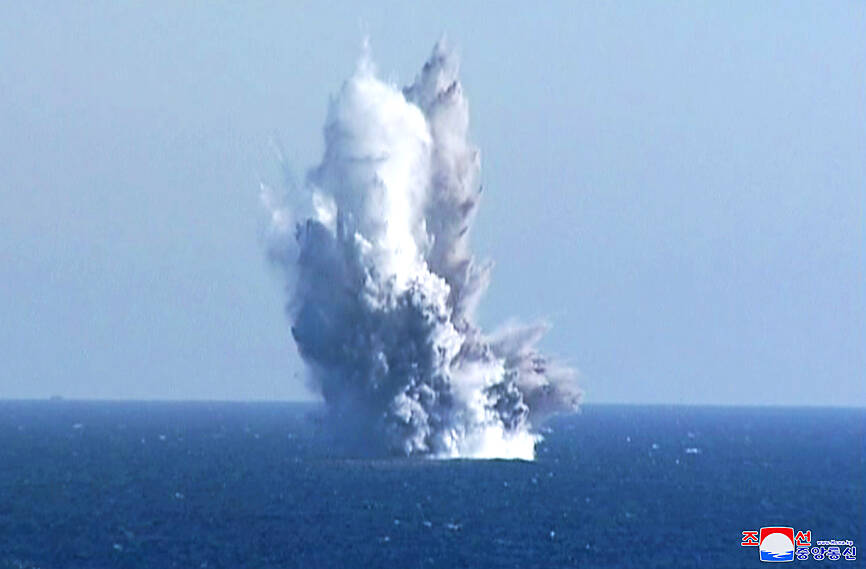North Korea yesterday said it had tested an underwater nuclear attack drone able to unleash a “radioactive tsunami,” as it blamed US-South Korea exercises for a deteriorating regional security situation.
Pyongyang carried out military drills of its own in response this week, including test-firing a new nuclear-capable underwater drone, state media reported.
The weapon’s mission is to “stealthily infiltrate into operational waters and make a super-scale radioactive tsunami ... to destroy naval striker groups and major operational ports of the enemy,” the Korean Central News Agency (KCNA) said.

Photo: EPA-EFE / KCNA
The new weapon, called Haeil, meaning “tsunami” in Korean, “can be deployed at any coast and port or towed by a surface ship for operation,” the report said.
North Korean leader Kim Jong-un oversaw Tuesday’s test, KCNA said, and images released by the daily Rodong Sinmun showed a smiling Kim and what appeared to be an underwater explosion.
The agency also said that Pyongyang on Wednesday fired strategic cruise missiles “tipped with a test warhead simulating a nuclear warhead.”
However, analysts questioned North Korea’s claims.
The idea that Pyongyang has “a nuclear-capable underwater drone should be met with skepticism,” said Leif-Eric Easley, a professor at Ewha Womans University in Seoul.
“Pyongyang’s claims about a new weapons system are not the same as a credible demonstration of capability,” he added.
US-based analyst Ankit Panda wrote on Twitter that it could not be ruled out that the announcement was “an attempt at deception/psyop.”
Even so, the claim was “shocking,” said Cheong Seong-chang, a researcher at the private Sejong Institute.
If true, it is hard to see how Seoul “could respond to such a formidable new weapon from North Korea that [it says] can completely destroy the South’s major operational ports,” Cheong said.
The KCNA statement showed that “Pyongyang is more than ready to use its tactical nuclear weapons at any time,” said An Chan-il, a defector-turned-researcher based in Seoul. “This obviously further strengthens Kim’s justification for his future nuclear tests.”
Russia has reportedly developed a similar weapon — nuclear-capable Poseidon torpedoes — but mastering the complex technology required for such weaponry might yet be beyond North Korea, experts said.
“For an unmanned submarine to go deep underwater undetected, it requires advanced technology such as control sensors and radar,” said Choi Gi-il, a professor of military studies at Sangji University in Wonju, South Korea.
North Korea has not acquired this “to an extent that it can deploy nuclear unmanned sea drones in combat yet,” but its claims about the Haeil drone fit a broader pattern, Choi said.
Pyongyang has moved on from simply stockpiling nuclear warheads and is “attempting to further advance and diversify launch mediums,” Choi said, adding that further testing could yet give the North Korean military “formidable” new ways to deliver a nuclear payload.

DEFENDING DEMOCRACY: Taiwan shares the same values as those that fought in WWII, and nations must unite to halt the expansion of a new authoritarian bloc, Lai said The government yesterday held a commemoration ceremony for Victory in Europe (V-E) Day, joining the rest of the world for the first time to mark the anniversary of the end of World War II in Europe. Taiwan honoring V-E Day signifies “our growing connections with the international community,” President William Lai (賴清德) said at a reception in Taipei on the 80th anniversary of V-E Day. One of the major lessons of World War II is that “authoritarianism and aggression lead only to slaughter, tragedy and greater inequality,” Lai said. Even more importantly, the war also taught people that “those who cherish peace cannot

STEADFAST FRIEND: The bills encourage increased Taiwan-US engagement and address China’s distortion of UN Resolution 2758 to isolate Taiwan internationally The Presidential Office yesterday thanked the US House of Representatives for unanimously passing two Taiwan-related bills highlighting its solid support for Taiwan’s democracy and global participation, and for deepening bilateral relations. One of the bills, the Taiwan Assurance Implementation Act, requires the US Department of State to periodically review its guidelines for engagement with Taiwan, and report to the US Congress on the guidelines and plans to lift self-imposed limitations on US-Taiwan engagement. The other bill is the Taiwan International Solidarity Act, which clarifies that UN Resolution 2758 does not address the issue of the representation of Taiwan or its people in

Taiwanese Olympic badminton men’s doubles gold medalist Wang Chi-lin (王齊麟) and his new partner, Chiu Hsiang-chieh (邱相榤), clinched the men’s doubles title at the Yonex Taipei Open yesterday, becoming the second Taiwanese team to win a title in the tournament. Ranked 19th in the world, the Taiwanese duo defeated Kang Min-hyuk and Ki Dong-ju of South Korea 21-18, 21-15 in a pulsating 43-minute final to clinch their first doubles title after teaming up last year. Wang, the men’s doubles gold medalist at the 2020 and 2024 Olympics, partnered with Chiu in August last year after the retirement of his teammate Lee Yang

The Philippines yesterday criticized a “high-risk” maneuver by a Chinese vessel near the disputed Scarborough Shoal (Huangyan Island, 黃岩島) in a rare incident involving warships from the two navies. The Scarborough Shoal — a triangular chain of reefs and rocks in the contested South China Sea — has been a flash point between the countries since China seized it from the Philippines in 2012. Taiwan also claims the shoal. Monday’s encounter took place approximately 11.8 nautical miles (22km) southeast” of the Scarborough Shoal, the Philippine military said, during ongoing US-Philippine military exercises that Beijing has criticized as destabilizing. “The Chinese frigate BN 554 was